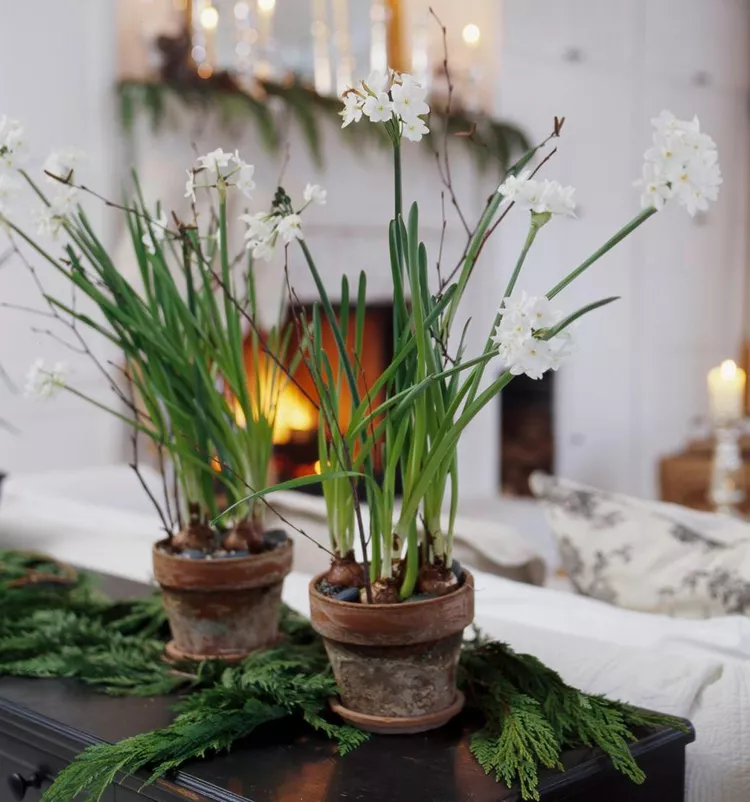How to Plant and Grow Paperwhites

Paperwhites are winter-flowering perennial bulbs with varying degrees of fragrance, depending on the type. Paperwhites are loved for their pretty white blooms that last for about two weeks. After they've faded, snip off the flowers and enjoy the green leaves as a houseplant for a few more weeks.
Paperwhites are in the same family as daffodils, Narcissus. Paperwhites are closely identified with the winter holidays when they're used to add fresh flowers to indoor celebrations.
According to the ASPCA, paperwhites can be toxic to dogs and cats if ingested. Keep out of reach of your pets.
Where to Plant Paperwhites
While paperwhites can be planted outdoors in USDA Hardiness Zones 9-11, most of the time, they're planted indoors in pots or vases. Paperwhites are most often grown without soil, and the bulbs are placed in a pile of rocks or small stones, where a little water is added to them and replenished only when needed.
How and When to Plant Paperwhites
Paperwhites grow in late fall to early winter when planted indoors. Plant between five to eight bulbs together. They look more impressive in large groups than if they're more sparsely planted. Pack paperwhite bulbs snugly into your selected pot. Each bulb will give you a multitude of small flowers.
You can grow paperwhites in either soil or water. To grow these bulbs in water, use decorative shallow dishes or trays at least 4 inches deep. Fill the containers with 2-3 inches of stones, pebbles, or glass beads. Nestle in the bulbs, pointy sides up, and add water just to touch the bottom of the dried roots, but not the bulb itself.
Paperwhite Care Tips
An ample container, a bit of water, and a spot with sunlight are the most important things these bulbs need to grow and blossom. You'll often see paperwhites supported with slim stakes, twine, or a metal ring around the foliage, due to their tendency to flop over.
Light
Start by placing paperwhites that are settled in their containers in a cool, dry place. Once roots have grown, move them to a spot with bright but indirect sunlight.
Soil and Water
Watering paperwhites is easier to manage when you plant them in potting soil in a container with a drainage hole. Start with a few inches of soil, then tuck in the bulbs and add soil up to the top third of the bulbs. Water to keep the soil moist but not soggy. Stash your planted bulbs in a cool spot (55-65˚F) for a couple of weeks. They don't need light at this point, but once you see some green growth, move them into a warmer, well-lit location.
Paperwhite bulbs are very sensitive to water. When you grow paperwhites in water with rocks or stones, add only enough water to barely make contact with the bottom of the bulbs. The roots will reach down into the water, but if the bulb is sitting in water, it will rot.
Remember to check the water daily if you've planted them on stones and every other day if they're planted in soil.
Temperature and Humidity
Paperwhites that have started to grow need bright light, but the flowers will last longer if the plants stay around 65˚F. An ideal location could be a cool windowsill with indirect sunlight or a tabletop near a sunny window. Avoid a southern window with the sun streaming in all afternoon.
Fertilizer
Paperwhites don't need fertilizer—just air, water and sunlight.
Pruning
Because paperwhites bloom for only two weeks, there's no need to prune them.
Potting and Repotting Paperwhites
It's possible to replant paperwhites in soil to grow new flowers once their blooms have died, but it will take at least two to three years for new growth to occur.
Pests and Problems
When grown indoors, pests are not a problem for paperwhites. Mold and rot can develop if there's too much water in their pots or soil.
Types of Paperwhites
Ziva
'Ziva' is a popular variety with bright white flowers, a strong fragrance, and fast growth.
Grand Soleil d'Or
Grand Soleil d'Or has an orange cup, yellow petals, and a bold fragrance.
Nir
Nir has short stems, a mild fragrance, and showy white flowers.